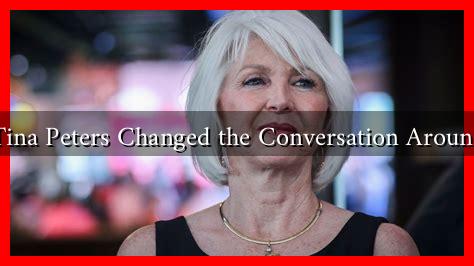-
Table of Contents
How Has Tina Peters Changed the Conversation Around Elections
The conversation surrounding elections in the United States has been increasingly polarized and contentious, particularly in the wake of the 2020 presidential election. One figure who has emerged as a controversial yet pivotal player in this dialogue is Tina Peters, the former Mesa County Clerk and Recorder in Colorado. Peters has become a symbol of the debate over election integrity, raising questions about the security of voting systems and the transparency of electoral processes. This article explores how Tina Peters has influenced the conversation around elections, the implications of her actions, and the broader context of election integrity in America.
The Rise of Tina Peters
Tina Peters gained national attention after she alleged that there were significant vulnerabilities in Colorado’s voting systems. Her claims were fueled by her decision to allow unauthorized access to voting machine data, which she later shared with various conspiracy theorists and far-right groups.
. This act not only led to her suspension from her position but also ignited a firestorm of debate regarding election security.
Key Contributions to the Election Integrity Debate
Peters’ actions have contributed to several key themes in the ongoing conversation about election integrity:
- Highlighting Vulnerabilities: Peters’ claims have brought attention to the potential weaknesses in voting technology. Her assertions have prompted discussions about the need for more robust security measures in electronic voting systems.
- Public Distrust: By promoting the idea that elections are susceptible to fraud, Peters has tapped into a growing sentiment among certain segments of the population that distrust the electoral process. This has led to increased scrutiny of election officials and systems.
- Grassroots Movements: Peters has inspired grassroots movements advocating for election audits and transparency. Her supporters argue that her actions are a necessary step toward ensuring fair elections.
Case Studies and Examples
Several instances illustrate how Peters’ actions have reverberated through the electoral landscape:
- Colorado’s Response: Following Peters’ allegations, Colorado Secretary of State Jena Griswold initiated a comprehensive review of voting systems in the state. This response highlights the tension between election officials and those questioning the integrity of the electoral process.
- National Attention: Peters has appeared on various media platforms, including conservative talk shows and social media, amplifying her message and reaching a wider audience. This has contributed to a national dialogue about election integrity, particularly among right-leaning groups.
- Legal Consequences: Peters faces legal challenges for her actions, including potential criminal charges related to her unauthorized access to voting machine data. This situation underscores the legal and ethical complexities surrounding election integrity claims.
The Broader Context of Election Integrity
The conversation around election integrity is not solely about Peters; it reflects a broader national trend. According to a 2021 survey by the Brennan Center for Justice, nearly two-thirds of Americans believe that voter fraud is a significant problem, despite evidence showing that it is exceedingly rare. This perception has led to a wave of legislation aimed at tightening voting laws across various states.
Moreover, Peters’ actions have sparked discussions about the role of technology in elections. As more states adopt electronic voting systems, the need for transparency and security becomes paramount. The debate is further complicated by the influence of social media, where misinformation can spread rapidly, shaping public opinion and policy.
Conclusion: The Lasting Impact of Tina Peters
Tina Peters has undeniably changed the conversation around elections in the United States. By raising questions about election integrity and security, she has tapped into a deep-seated distrust among certain voter demographics. While her actions have led to significant controversy and legal challenges, they have also sparked important discussions about the future of electoral processes in America.
As the nation continues to grapple with issues of election integrity, Peters’ influence serves as a reminder of the complexities involved in ensuring fair and transparent elections. The ongoing dialogue will likely shape electoral policies and public perceptions for years to come, making it essential for all stakeholders to engage thoughtfully in this critical issue.
For more information on election integrity and related topics, you can visit the Brennan Center for Justice.





